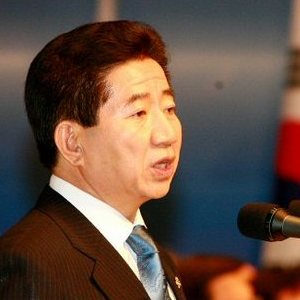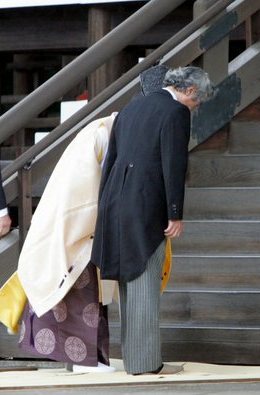Posted on : Aug.15,2006 13:42 KST
Modified on : Aug.15,2006 14:00 KST
 |
|
President Roh Moo-hyun
|
South Korean President Roh Moo-hyun on Tuesday called on Japanese political leaders to repent for their country's past wrongdoings and end visits to the controversial Yasukuni Shrine.
In his address at a ceremony marking Liberation Day, the president said Japan has to take substantive measures for the settlement of pending bilateral issues, such as the shrine visits, history textbook distortions and the Dokdo islets.
The president stressed that his government's bid to regain control of the country's forces during wartime from the United States is part of efforts to protect South Korea's sovereign rights.
He also said U.S. possession of wartime operational control of South Korean forces does not conform to the country's constitutional spirit.
Tuesday marks the 61st anniversary of Korea's liberation from Japan's 1910-45 colonial rule.
Roh's address came hours after Japanese Prime Minister Junichiro Koizumi visited the controversial Yasukuni Shrine honoring Japan's 2.5 million war dead including executed Class-A war criminals, in defiance of repeated warnings from Seoul.
 |
|
Japan's prime minister Junichiro Koizumi pays tribute at the controversial shrine on August 15.
|
Koizumi had visited the shrine five times since taking office in 2001, but the latest trip was the first time he went there on Aug. 15, the anniversary of Japan's surrender in World War II. His shrine visit has been seen as a glorification of Japan's past militarism.
"We should try to build a new order of unity in Northeast Asia.
The confrontational structure will not be dissipated as long as one side is pitted against another and each bloc mistrusts and restrains the other," said Roh.
"We need to keep a vigilant eye on any international hegemonism that threatens regional peace and a cooperative order. It was the hegemonism of the major powers that shattered peace of Northeast Asia in the past."
The president went on to express concerns over Tokyo's move to amend its pacifist constitution.
"A long time has passed since the end of World War II and it may be unwarranted to raise an issue with the amendment itself.
Japan should wholeheartedly reflect upon their actions in the past, act on their past apologies on several occasions, and prove in a clear manner that it has no intention of repeating them," the president said.
"Japan should take substantive actions to resolve the issues surrounding Dokdo, history textbooks, visits to the Yasukuni Shrine, and military sex slaves during World War II. Desirable examples can be found in the case of Germany that recognized the Oder-Neisse border and collaborated in recent years with its neighboring countries, including France and Poland, to jointly publish history textbooks."
The president then stressed that the recovery of wartime operational control is tantamount to establishing the nation's sovereignty rightfully and remedying an abnormal state that differs from the constitutional spirit with regard to the authority to command troops.
"We need to be armed with the resolute will and ability to defend our own soil. To this end, the Participatory Government is pursuing national defense reform to enforce the capacity for self-defense. We are also pursuing to develop the Korea-U.S. cooperative relations for national security in a future-oriented direction, as seen in the redeployment of the United States Forces Korea," said Roh.
"It is also a reflection of the changed stature of our armed forces. This is a task for which we have made preparations and we have proceeded with in close and systematic coordination with the United States over the past 20 years."
He also reiterated that the ongoing Korea-U.S. FTA negotiations would be a challenge aimed at bringing about an economically advanced Korea.
Turning to inter-Korean relations, the president urged North Korea to immediately rejoin the stalled six-way talks on its nuclear weapons program.
"North Korea should return to the six-party talks without preconditions. We will spare no proactive efforts and assistance to help North Korea give up its nuclear program and, at the same time, improve its ties with the United States and other major nations, hence steering itself along the road toward peace and common prosperity," said Roh.
"The nations participating in the six-way talks should try different forms of dialogue to help resume and develop the talks.
The September 19 Joint Statement that was hammered out in the six-party talks last year outlines a starting point for not only the resolution of the North Korean nuclear issue but also the formation of a new order in Northeast Asia."
SEOUL, Aug. 15 (Yonhap)








